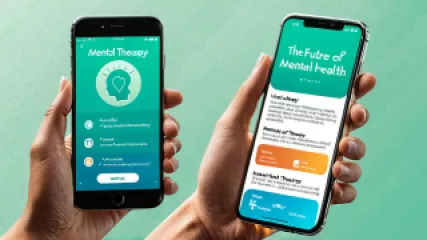The Future of Mental Health Apps: Virtual Therapy Platforms on the Rise
The Future of Mental Health Apps: Virtual Therapy Platforms on the Rise
In recent years, there has been a significant increase in the use of mental health apps. As technology continues to advance, it is clear that virtual therapy platforms are becoming more prevalent and will play a crucial role in shaping the future of mental health care. In this opinion piece, we will explore why I believe virtual therapy platforms are on the rise and discuss their potential impact on the field of mental health.
The Need for Accessible Mental Health Care
One of the primary reasons why virtual therapy platforms are gaining popularity is their ability to provide accessible mental health care. Many individuals face barriers when seeking traditional therapy, such as long wait times, high costs, and limited availability of therapists in their area. Virtual therapy platforms eliminate these barriers by offering therapy sessions that can be accessed from anywhere at any time.
Virtual therapy platforms also address the issue of stigma surrounding mental health. Some individuals may feel uncomfortable seeking therapy in person due to fear of judgment or social stigma. By offering therapy sessions in a virtual setting, individuals can receive the help they need without facing these barriers.
The Convenience of Virtual Therapy Sessions
Another reason for the rise of virtual therapy platforms is the convenience they offer. With virtual therapy sessions, individuals can schedule appointments that fit their busy lifestyles. There is no need to commute to a therapist's office, saving both time and money. This convenience factor makes virtual therapy an attractive option for many individuals who may have otherwise been unable to commit to regular in-person therapy sessions.
Additionally, virtual therapy platforms often provide flexibility in terms of appointment length. Some individuals may prefer shorter, more frequent sessions, while others may benefit from longer, in-depth conversations. Virtual therapy platforms can accommodate these preferences, allowing individuals to tailor their therapy experience to their specific needs.
Mindfulness Tools and Interactive Features
Virtual therapy platforms are not just limited to traditional therapy sessions. Many of these platforms also offer a wide range of mindfulness tools and interactive features to enhance the therapeutic experience. These tools can include guided meditation exercises, journaling prompts, mood tracking, and more.
By incorporating these tools into the platform, virtual therapy providers encourage individuals to actively engage in their mental health journey outside of therapy sessions. This empowers individuals to take ownership of their well-being and fosters a sense of self-awareness and personal growth.
The Potential Impact on Mental Health Care
As virtual therapy platforms continue to evolve and advance, their potential impact on mental health care is significant. These platforms have the potential to reach a larger number of individuals who may have previously been unable to access therapy due to various barriers.
Furthermore, virtual therapy platforms can help alleviate the strain on traditional mental health care systems. With the increasing demand for mental health services, there is often a shortage of therapists available to meet this demand. Virtual therapy platforms can help bridge this gap by providing additional support and resources to those in need.
Conclusion
The future of mental health apps lies in the rise of virtual therapy platforms. These platforms offer accessible and convenient mental health care options that can reach a wider audience. With the inclusion of mindfulness tools and interactive features, virtual therapy platforms have the potential to revolutionize the field of mental health care. As technology continues to advance, it is crucial that we embrace the opportunities presented by virtual therapy platforms to provide effective and inclusive mental health support for all.






